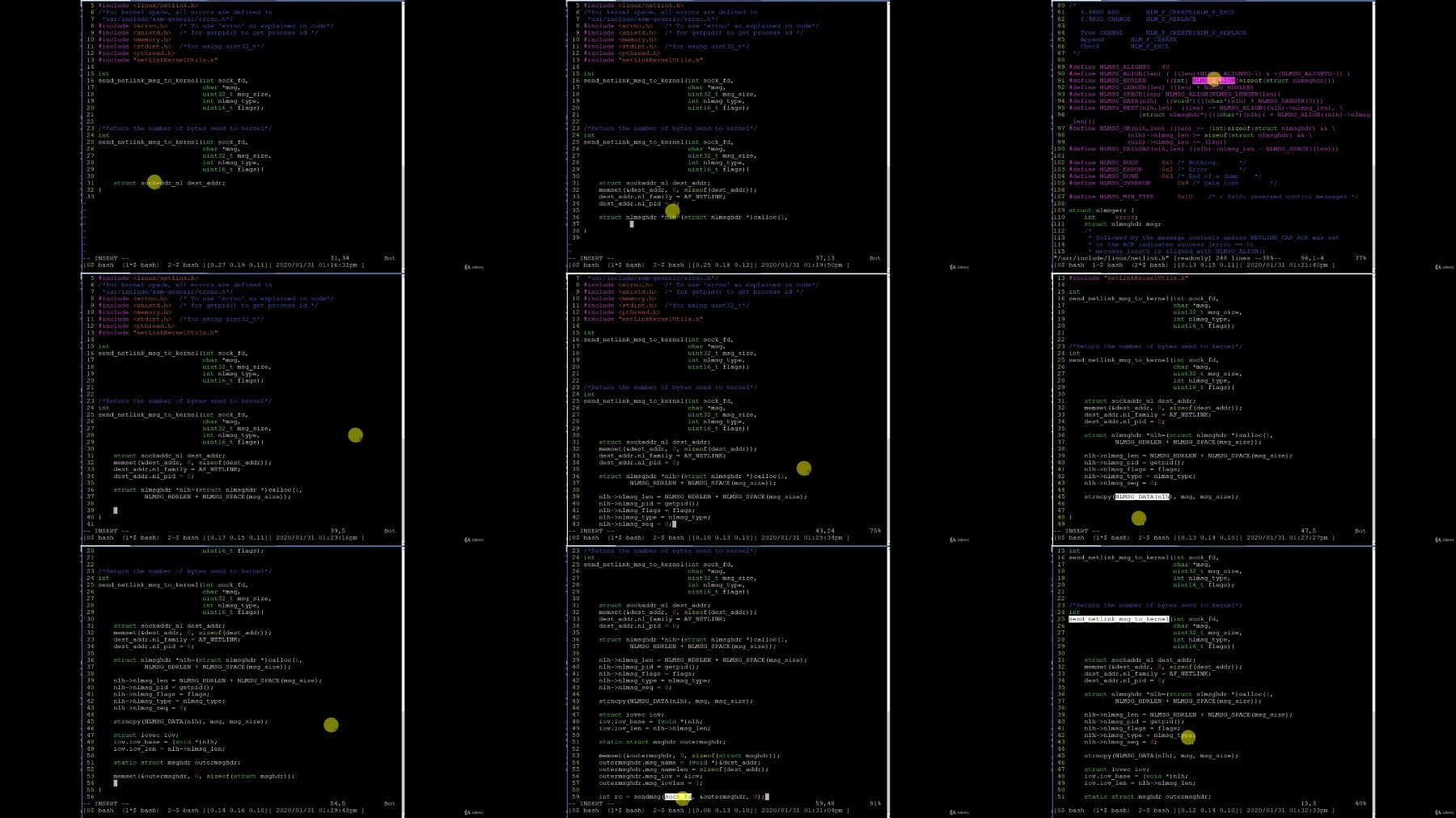Linux Kernel Programming - IPC b/w Userspace and KernelSpace

Linux Kernel Programming - IPC b/w Userspace and KernelSpace
Video: .mp4 (1280x720, 30 fps(r)) | Audio: aac, 44100 Hz, 2ch | Size: 1.05 GB
Genre: eLearning Video | Duration: 33 lectures (2 hour, 47 mins) | Language: English
System Programming - Learn Netlink Sockets, Operating Systems, Loadable Kernel Modules, C programming From Scratch
What you'll learn
Linux Kernel Modules (LKM)
Netlink Sockets
Concept of TLVs (Type Length Value)
User-space and Kernel Space Communication
Linux Kernel Programming
Multicast from Kernel Space to User Space
Event based notification from Kernel Space to User-space
Requirements
C programming is essential and must
At-least High level Operating system Knowledge shall be good
Linux Operating System running as VM
Description
** I am Still Adding Content to this Course** - Last Updated: 11 Oct 2020
Welcome to the Linux Kernel Programming world! This is the course on Netlink Sockets in which I have covered Netlink Sockets in Detail which is a kernel facility provided to userspace applications to carry out bidirectional IPC with kernel space. In this course, We shall learn how Netlink Sockets can be used to exchange Netlink Messages between Kernel and Userspace.
This Course could also be your first step towards entering the kernel programming world !! This is a good starting point for those who will be writing kernel code for the first time. We shall be writing lots of lots of kernel and userspace code to understand Netlink Based communication. Need-less to say you should be good with C programming.
Table Of Contents :
******************
Section 1 : Setting Up Development Environment
Agenda, Pre-requiste, Assumption
How to do Kernel Programming based Courses ?
Setting up Development Environment
Installing Linux Kernel Headers
Section 2 : Writing Linux Kernel Modules
What are LKMs ?
Hellow-World LKM
Section 3 : Understanding Netlink Sockets
Communication Mediums in the System
Sockets - As a unified interface
Netlink Communication Use-Cases
The Netlink Project for the Course
Section 4 : Netlink Communication - Theory before Coding
Netlink Msg formats
Netlink Msg types
Netlink Msg flags
Netlink Communication Model
Netlink Sequence Number
Netlink Port ID
Section 5 & 6 : Writing a First Netlink Program
Greet Kernel from Userspace
Receive Reply from Kernel to Userspace
Section 7 : The Netlink Attributes - The Concept of TLVs
The Concept of TLVs
Parsing of TLV Buffer << Delivered till here as on 30 Aug 2020
Section 6 : Getting Started with Netlink Project
Problem Statement
Sending CREATE Netlink Msg to Kernel
Getting Feedback/Reply from Kernel to Userspace
Sending UPDATE Netlink Msg to Kernel
Netlink DELETE Netlink Msg to Kernel
Netlink READ operation Reading Data from Kernel Space into USer space
Section 7 : Netlink Group Subscription
Sending Kernel Data to Multiple Userspace processes
Multicast Group Subscription
Multicast Group unsubscription
Section 8 : Selective Event-based Notification
(Un)Subscribing for the event in Kernel Space
Where to go from here?
Who this course is for:
Computer Science Students
Working Professional
Freelancers
Kernel Programming and System Programming Enthusiast
For More Courses Visit & Bookmark Your Preferred Language Blog
From Here: - - - - - - - -
Download Links

What you'll learn
Linux Kernel Modules (LKM)
Netlink Sockets
Concept of TLVs (Type Length Value)
User-space and Kernel Space Communication
Linux Kernel Programming
Multicast from Kernel Space to User Space
Event based notification from Kernel Space to User-space
Requirements
C programming is essential and must
At-least High level Operating system Knowledge shall be good
Linux Operating System running as VM
Description
** I am Still Adding Content to this Course** - Last Updated: 11 Oct 2020
Welcome to the Linux Kernel Programming world! This is the course on Netlink Sockets in which I have covered Netlink Sockets in Detail which is a kernel facility provided to userspace applications to carry out bidirectional IPC with kernel space. In this course, We shall learn how Netlink Sockets can be used to exchange Netlink Messages between Kernel and Userspace.
This Course could also be your first step towards entering the kernel programming world !! This is a good starting point for those who will be writing kernel code for the first time. We shall be writing lots of lots of kernel and userspace code to understand Netlink Based communication. Need-less to say you should be good with C programming.
Table Of Contents :
******************
Section 1 : Setting Up Development Environment
Agenda, Pre-requiste, Assumption
How to do Kernel Programming based Courses ?
Setting up Development Environment
Installing Linux Kernel Headers
Section 2 : Writing Linux Kernel Modules
What are LKMs ?
Hellow-World LKM
Section 3 : Understanding Netlink Sockets
Communication Mediums in the System
Sockets - As a unified interface
Netlink Communication Use-Cases
The Netlink Project for the Course
Section 4 : Netlink Communication - Theory before Coding
Netlink Msg formats
Netlink Msg types
Netlink Msg flags
Netlink Communication Model
Netlink Sequence Number
Netlink Port ID
Section 5 & 6 : Writing a First Netlink Program
Greet Kernel from Userspace
Receive Reply from Kernel to Userspace
Section 7 : The Netlink Attributes - The Concept of TLVs
The Concept of TLVs
Parsing of TLV Buffer << Delivered till here as on 30 Aug 2020
Section 6 : Getting Started with Netlink Project
Problem Statement
Sending CREATE Netlink Msg to Kernel
Getting Feedback/Reply from Kernel to Userspace
Sending UPDATE Netlink Msg to Kernel
Netlink DELETE Netlink Msg to Kernel
Netlink READ operation Reading Data from Kernel Space into USer space
Section 7 : Netlink Group Subscription
Sending Kernel Data to Multiple Userspace processes
Multicast Group Subscription
Multicast Group unsubscription
Section 8 : Selective Event-based Notification
(Un)Subscribing for the event in Kernel Space
Where to go from here?
Who this course is for:
Computer Science Students
Working Professional
Freelancers
Kernel Programming and System Programming Enthusiast
For More Courses Visit & Bookmark Your Preferred Language Blog
From Here: - - - - - - - -
Download Links

